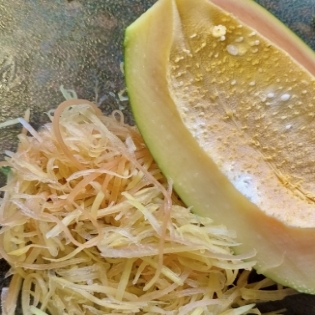RAW PAPAYA

Papaya is an abundant source of vitamin A and C. If consumed on a regular basis, it might help to improve eyesight and prevent early age blindness in children. Papaya fruit contains nutrients such as provitamin, dietary fibre and minerals, which might help to deal with toothache, mouth ulcers and gum disease. Papaya is a rich source of folic acid. It might help to form certain proteins, which are beneficial to overcome the risk of developing a heart attack or stroke. The vitamin C-rich papaya might have an anti-inflammatory activity that may help reduce the pain and swelling in the joints, such as in rheumatoid arthritis, which involves pain in two or more joints.
Nutritional Count Of Raw Papaya ( 100 G )
- Calories – 62 kcal
- Fats – 0.4 g
- Carbs – 16 g
- Sugars – 11 g
- Protein – 0.7 g
- Fiber – 2.5 g
Improves Digestion
- Eating raw papaya might benefit the food digestion process. Unripe papaya might contain a good amount of digestive enzyme, which might be an excellent aid to digestion. It may help in the smooth digestion of protein present in the food. People who cannot digest wheat gluten may tolerate it if it is mixed with the white latex of raw papaya. It has the crude papain enzyme, which might help solubilise gluten protein. Hence, it may be used by people who have trouble with the digestion of protein-containing food items.
Improves Skin
- Papaya is a fat-free, nutrient-rich source of healthy carbohydrates, including fiber. It provides plenty of vitamin C. Vitamin C is a precursor that our bodies use to manufacture collagen. Because collagen is a critical component required for skin integrity, getting enough vitamin C improves your skin`s ability to repair itself. To build strong connective tissues and heal properly from wounds, our bodies depend on vitamin C. Papaya is an easy way to reach your daily goals.
Rich In Fiber
- Papayas are rich in fiber, essential for good digestion. Beyond this fundamental benefit, papayas also contain the enzyme papain. Papaya helps break down proteins. If you have difficulty chewing or digesting meat, tenderizing it with papain before cooking makes it easier to eat. Papaya has also been studied for its ability to assist with gluten digestion in people with non-celiac gluten sensitivity. Papaya are a safe, healthy way to get this beneficial micronutrient.
Supports Heart Health
- The fiber in papayas helps support heart health. Eating enough fiber (primarily through fruits and vegetables) decreases the risk of heart disease. Fiber also increases satiety, which can help with healthy weight management. Papayas also provide potassium, magnesium, and pantothenic acid, all of which contribute to cardiovascular health. the combination of vitamins A, C, and E in papayas provide powerful antioxidant effects that may reduce free radicals and cancer risk.
Supports Regular Bowel Movement
- The green papaya's antioxidant properties aid the body in eliminating harmful substances. The laxative fibres in green papaya bond to cancer-causing chemicals and flush them out with a bowel movement. Constipation, piles, and diarrhoea are also helped by this. Asthma, gout, osteoarthritis, and rheumatoid arthritis patients can benefit from green papaya because of its anti-inflammatory characteristics. Vitamin A is also present, reducing lung irritation from smoking. Fresh green papaya juice can also reduce swelling in the tonsils.
- Green papaya is the same fruit as orange papaya, with a firm white flesh that hasn't ripened yet. The unripened fruit of the papaya tree, which is called raw papaya or green papaya, is beneficial to health in many ways. The enzyme activity of green papaya is higher than that of mature papaya. With vitamins C, B, and E, potassium, fibre, magnesium, and very few calories, green papaya is a superfood that delivers on all fronts when it comes to health benefits. Green papaya is nutrition dense, and unripe green papaya is rich in antioxidants that protect against cardiovascular disease.


